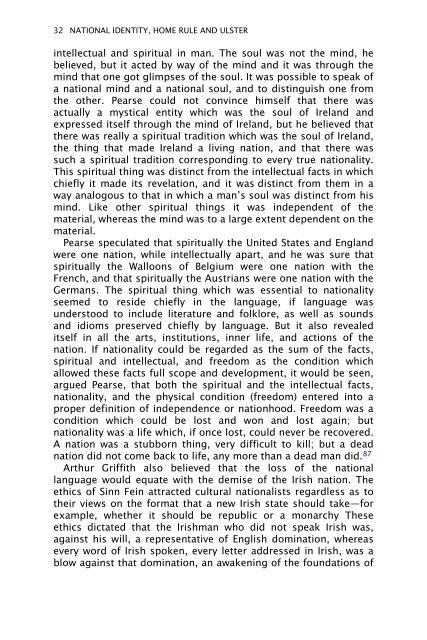Dividing Ireland: World War I and Partition
Dividing Ireland: World War I and Partition
Dividing Ireland: World War I and Partition
Create successful ePaper yourself
Turn your PDF publications into a flip-book with our unique Google optimized e-Paper software.
32 NATIONAL IDENTITY, HOME RULE AND ULSTER<br />
intellectual <strong>and</strong> spiritual in man. The soul was not the mind, he<br />
believed, but it acted by way of the mind <strong>and</strong> it was through the<br />
mind that one got glimpses of the soul. It was possible to speak of<br />
a national mind <strong>and</strong> a national soul, <strong>and</strong> to distinguish one from<br />
the other. Pearse could not convince himself that there was<br />
actually a mystical entity which was the soul of <strong>Irel<strong>and</strong></strong> <strong>and</strong><br />
expressed itself through the mind of <strong>Irel<strong>and</strong></strong>, but he believed that<br />
there was really a spiritual tradition which was the soul of <strong>Irel<strong>and</strong></strong>,<br />
the thing that made <strong>Irel<strong>and</strong></strong> a living nation, <strong>and</strong> that there was<br />
such a spiritual tradition corresponding to every true nationality.<br />
This spiritual thing was distinct from the intellectual facts in which<br />
chiefly it made its revelation, <strong>and</strong> it was distinct from them in a<br />
way analogous to that in which a man’s soul was distinct from his<br />
mind. Like other spiritual things it was independent of the<br />
material, whereas the mind was to a large extent dependent on the<br />
material.<br />
Pearse speculated that spiritually the United States <strong>and</strong> Engl<strong>and</strong><br />
were one nation, while intellectually apart, <strong>and</strong> he was sure that<br />
spiritually the Walloons of Belgium were one nation with the<br />
French, <strong>and</strong> that spiritually the Austrians were one nation with the<br />
Germans. The spiritual thing which was essential to nationality<br />
seemed to reside chiefly in the language, if language was<br />
understood to include literature <strong>and</strong> folklore, as well as sounds<br />
<strong>and</strong> idioms preserved chiefly by language. But it also revealed<br />
itself in all the arts, institutions, inner life, <strong>and</strong> actions of the<br />
nation. If nationality could be regarded as the sum of the facts,<br />
spiritual <strong>and</strong> intellectual, <strong>and</strong> freedom as the condition which<br />
allowed these facts full scope <strong>and</strong> development, it would be seen,<br />
argued Pearse, that both the spiritual <strong>and</strong> the intellectual facts,<br />
nationality, <strong>and</strong> the physical condition (freedom) entered into a<br />
proper definition of independence or nationhood. Freedom was a<br />
condition which could be lost <strong>and</strong> won <strong>and</strong> lost again; but<br />
nationality was a life which, if once lost, could never be recovered.<br />
A nation was a stubborn thing, very difficult to kill; but a dead<br />
nation did not come back to life, any more than a dead man did. 87<br />
Arthur Griffith also believed that the loss of the national<br />
language would equate with the demise of the Irish nation. The<br />
ethics of Sinn Fein attracted cultural nationalists regardless as to<br />
their views on the format that a new Irish state should take—for<br />
example, whether it should be republic or a monarchy These<br />
ethics dictated that the Irishman who did not speak Irish was,<br />
against his will, a representative of English domination, whereas<br />
every word of Irish spoken, every letter addressed in Irish, was a<br />
blow against that domination, an awakening of the foundations of








